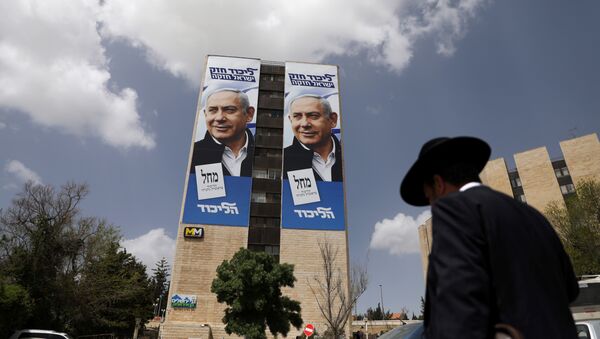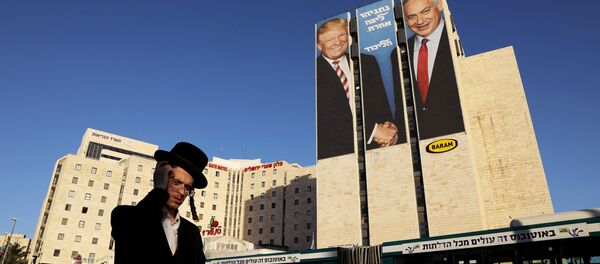Likud could reportedly form the largest right-wing bloc in the Knesset to create a simple majority in the 120-seat chamber, making Netanyahu Israel's longest-serving prime minister in the process. Sputnik has discussed the issue with Lior Sternfeld, assistant professor of history and Jewish studies at Penn State College of the Liberal Arts in the US.
Sputnik: Mr Netanyahu is set to become the prime minister for the fifth term. How unprecedented is this in Israeli politics? And why is there such great support for Mr Netanyahu among the Israeli public?
Lior Sternfeld: So, first of all, I think that in terms of the number of years that he [has] served in this position I think that he has already surpassed David Ben-Gurion, the founding father of Israel. But in terms of the great support, there is something that we have to break down a little bit and this is the political system in Israel.
You know, in Israel you vote for a party, not for the candidate. And the Likud Party got the votes of 27 percent of the public*. So it is a bit over a quarter of the public and it has exactly the same amount of seats as the main opposition, which is the Blue and White coalition. But in terms of forming coalition, he has the support of other satellite parties that help him to form a majority in the parliament (the Knesset). The way to explain it is, you know, it is part of this global wave of right-wing politics — I think that it helps to explain it.
Sputnik: Professor, what happens next? Which party is the Likud going to side with to form the governing coalition?
Lior Sternfeld: So, the new coalition is going to look very much like the old coalition.
It is going to be Netanyahu, the two orthodox parties: Shas and the Ashkenazi orthodox party; it is going to be the centre-right Kulanu Party — basically its platform is entirely on economics and taking care of the new middle class.
And he is going to get great support from the six seats of the right-wing Union Party, which is the far-right party of Israel. And all together they have 64 seats as of now.
Sputnik: In the run-up to the election, Mr Netanyahu said he would annex Israeli settlements if he wins a fifth term. Was it just campaign rhetoric or is there enough will to actually enact this?
So, just to remind you and the listeners: in 2009, when he was elected for his second term and President Obama was sitting in the White House, Netanyahu embraced and supported the two-state solution. He came publicly in support of the two-state solution.
So sure, he has shifted to the right over the years, but I think that he believed that it would gain him the votes of the far-right, which is true. The end result is much better for him than it shows for the far-right.
He may believe that there is an international situation that allows him to annex the West Bank now with President Trump and President Putin seem to be less inclined to initiate a peace process and he has the coalition of the Arab countries that right now don’t care about the Palestinian cause anymore.
So, I don’t think that it is something that is going to be initiated very soon, but I think that he is testing the waters.
Sputnik: How do you assess the US role as a mediator in peace talks between Palestine and Israel?
The US came out as a supporter of Israel, not that it was not clear before, but now with President Trump and all those gestures to Netanyahu and Israel, it shows that the US cannot be an honest broker in this process.
I think this is the time for the EU to step in.
Sputnik: In your opinion, what should be done to sign this peace agreement? Experts repeatedly said that both sides need to make concessions.
Lior Sternfeld: Yes, you know, I mean again, we are talking about the time that there is no active process and there is no will in Israel to initiate one. Netanyahu’s face is not towards a peace process.
I mean this is you can tell by his campaign rhetoric and you can see it by the way that he constructed his new coalition, that he is very much against a Palestinian state and peace process.
So, I think that right now what the mission of the international forces would be [is] to make sure that there is no major infringement of civil rights in Israel against the Palestinian citizens and try to contain the impact of the occupation in the West Bank and maybe try to release the blockade on Gaza.
Sputnik: Returning to Prime Minister Netanyahu, he still faces corruption charges. What is going to happen in this respect?
I think that this would be the biggest test of his early fifth term. If the Knesset would pass this law, Netanyahu is protected and he will not be indicted and he will basically continue to serve as prime minister for this full term, and possibly run for sixth and seventh and eighth terms.
Views and opinions expressed in this article are those of Lior Sternfeld and do not necessarily reflect those of Sputnik.
*The interview was made before the release of the final election results.







